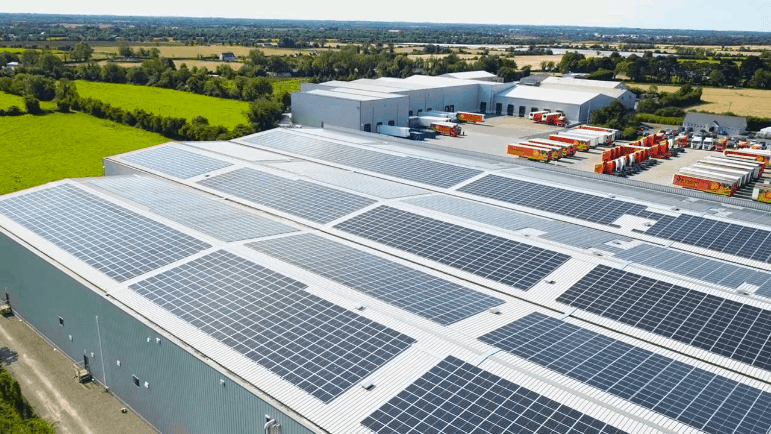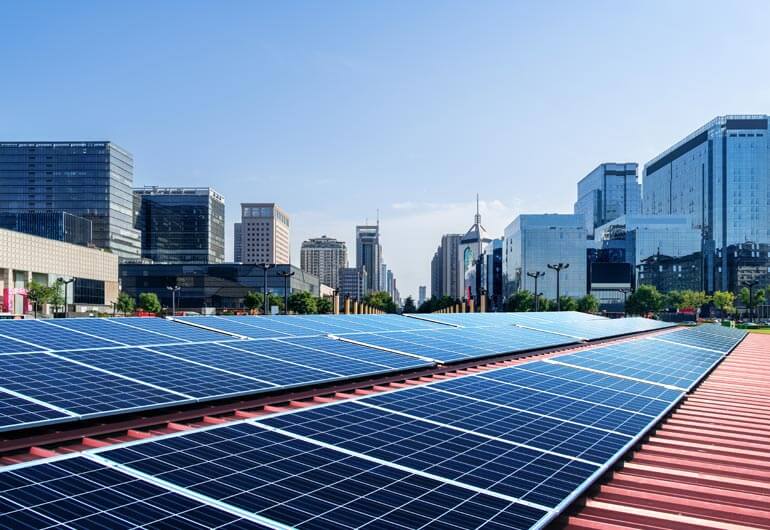In today’s rapidly changing world, businesses are increasingly turning to sustainable solutions to meet their energy needs while reducing their carbon footprint. Among these solutions, commercial solar panel modules stand out as a model of innovation and environmental responsibility. This comprehensive guide delves into the world of commercial solar, exploring its benefits, installation process, cost-effectiveness, and more.
Table of Contents
Utilize solar energy for business
Harnessing solar energy is not just environmentally friendly. This is also a strategic step towards long-term cost savings and energy independence. Commercial solar panels allow businesses to generate electricity, reducing dependence on traditional energy sources and volatile energy prices. Advances in technology and the falling cost of solar panels have significantly lowered the barrier to entry for companies of all sizes.
The rise of solar energy
Solar energy has increased rapidly in recent years due to advances in photovoltaic technology and increased environmental awareness. As companies seek ways to minimize their environmental impact and mitigate climate change, solar energy is emerging as a reliable and sustainable solution.
solar panels in a commercial environment
Commercial properties such as offices, warehouses, factories, and retail stores are prime candidates for solar panel installation. These large roofs and expansive grounds provide ample space for solar panels, maximizing energy production potential and optimizing return on investment.
Advantages of commercial solar panels
Investing in commercial solar panels offers a variety of benefits for businesses looking to increase profits while demonstrating corporate social responsibility.
1. Cost reduction
Commercial solar panels can help businesses significantly offset their electricity bills. By generating renewable energy on-site, businesses can reduce or eliminate dependence on grid electricity, resulting in significant cost savings over the life of the system.
2. Environmental impact
Reducing CO2 emissions is a top priority for companies committed to sustainability. Commercial solar panels generate clean, renewable energy without emitting harmful greenhouse gases, helping businesses reduce their carbon footprint and contribute to a healthier planet.
3. energy independence
Solar panels allow businesses to better manage their energy supply and costs. By generating electricity on-site, businesses become less vulnerable to utility price fluctuations and supply chain disruptions, making them more resilient and stable.
4. Tax benefits and rebates
Governments around the world offer a variety of incentives, tax credits, and rebates to encourage businesses to implement renewable energy solutions such as solar power. These financial incentives significantly offset the initial costs of installing commercial solar panels, making them an even more attractive investment.
5. Brand Reputation
Demonstrating a commitment to sustainability can improve a company’s brand reputation and attract environmentally conscious consumers. Visible use of solar energy allows companies to differentiate themselves in the market and appeal to a growing segment of environmentally conscious customers.
6. Long-term investment
Commercial solar panels have a long lifespan, typically lasting over 25 years with minimal maintenance. This long-term durability ensures that businesses reap energy savings and environmental benefits for years to come.
Installation process and considerations
Commercial solar panel installation requires several important steps, from initial site evaluation to system design, installation, and commissioning. Working with a reliable solar power provider is essential for a smooth and successful installation process.

Location evaluation
Before installing solar panels, a thorough site assessment is performed to assess factors such as roof condition, orientation, shading, and available sunlight. This evaluation helps determine the optimal system size and configuration to maximize energy production and efficiency.
system design
Once the site assessment is complete, a solar power engineer will design a solar power system customized to your company’s energy needs and site characteristics. This design phase includes selecting the appropriate solar panels, inverter, mounting hardware, and other components needed for installation.
Inverter selection
Inverters play a key role in converting the direct current (DC) produced by solar panels into alternating current (AC) that can be consumed at home or fed into the power grid. Selecting the appropriate inverter type and size is important to ensure optimal system performance and efficiency.
assembly solution
Solar modules are usually mounted on roofs or open spaces using special mounting materials. Which mounting solution you choose depends on factors such as roof type, orientation, slope angle, and available space.
Wiring and electrical connections
Once the solar panels and inverter are installed, an electrician will connect the components, wire the system to the main electrical panel, and ensure that local building codes and regulations are followed.
Mains connection
For grid-connected systems, businesses must obtain approval from their energy provider to install two-way meters to monitor the flow of energy between the solar PV system and the grid. This grid connection allows businesses to supply excess energy to the grid and receive credits or compensation for the excess power generated.
Solar power system maintenance and monitoring
Once installed, commercial solar panels require minimal maintenance to ensure optimal performance and longevity. Regular monitoring and maintenance activities help identify potential problems early and maximize energy production efficiency.
performance monitoring
Continuously monitoring the performance of solar power systems allows companies to track energy production, identify deviations from expected performance, and quickly address issues. The monitoring platform provides real-time data on energy production, system availability, and environmental factors, allowing companies to optimize their solar power investments.
Regular maintenance
Regular maintenance tasks for commercial solar panels include cleaning the panels to remove dirt, debris, and accumulated snow, checking electrical connections for signs of wear or damage, and cleaning the system. This may include checking whether components are functioning properly. Many solar energy providers offer maintenance plans to simplify ongoing maintenance and ensure system reliability.
Frequently Asked Questions
Q: How long do commercial solar panels last?
Commercial solar panels typically have a useful lifespan of 25 years or more, but many panels continue to produce electricity at reduced efficiency beyond this period.
Q: How long does it take to install commercial solar panels?
Commercial solar panel installation schedules vary depending on factors such as system size, complexity, and site conditions. The installation process can take an average of several weeks, from initial site assessment to commissioning.
Q: Will commercial solar panels work on cloudy or rainy days?
Solar panels are most efficient in direct sunlight, but they can also generate electricity on cloudy or rainy days. However, bad weather can reduce energy production.
Q: How do commercial solar panels impact property value?
Studies show that commercial properties with solar power systems have higher property values compared to properties without solar power systems. , it has been shown that the period until resale tends to be short. Solar panels are considered a valuable asset that provides long-term cost savings and environmental benefits.
Q: Is it possible to expand a commercial solar power system in the future?
Yes, a commercial solar panel system can be easily expanded or upgraded to adapt to changing energy needs and business growth. Additional panels can be installed on available roof space or ground-mounted structures, allowing businesses to grow their solar power investments over time.
Conclusion
Commercial solar panels offer businesses a path to sustainability, cost savings, and energy independence. By harnessing the power of the sun, companies can reduce their carbon footprint, reduce operating costs, and improve their reputation as environmentally conscious companies. Thanks to advances in technology and affordable financing options, there’s never been a better time for businesses to embrace solar energy and pave the way to a better, more sustainable future.


